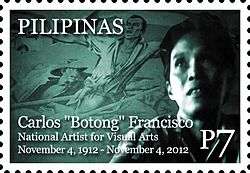Botong Francisco
| Botong Francisco | |
|---|---|
|
Francisco on a 2012 stamp of the Philippines | |
| Born |
Carlos Modesto Villaluz Francisco November 4, 1912 Angono, Rizal, Philippine Islands |
| Died |
March 31, 1969 (aged 56) Angono, Rizal, Philippines |
| Cause of death | Tuberculosis |
| Resting place | Heroes' Cemetery, Taguig, Philippines[1] |
| Nationality | Filipino |
| Other names | Botong |
| Occupation | Muralist |
| Religion | Roman Catholicism[1] |
| Parent(s) |
Felipe Francisco (father) Maria Villaluz (mother)[2] |
Carlos Modesto Villaluz Francisco[2] (November 4, 1912 – March 31, 1969), popularly known as Botong, was a muralist from Angono, Rizal.
Early life and career
Francisco was a most distinguished practitioner of mural painting for many decades and best known for his historical pieces. He was one of the first Filipino modernists along with Galo Ocampo and Victorio C. Edades who broke away from Fernando Amorsolo's romanticism of Philippine scenes. According to restorer Helmuth Josef Zotter, Francisco's art "is a prime example of linear painting where lines and contours appear like cutouts."[3]
His great works include Blood Compact, First Mass at Limasawa, The Martyrdom of Rizal, Bayanihan, Magpupukot, Fiesta, Bayanihan sa Bukid, Sandugo, Portrait of Purita, The Invasion of Limahong, Serenade, and Muslim Betrothal. Some of his murals have suffered damage over the years. The "Pageant of Commerce" emerged from several years of restoration in 2000.[3]
His murals in the lobby of the Philippine General Hospital were restored for the 3rd time in 2007.[4]
He was also responsible for the discovery of the now famous Angono Petroglyphs in 1965. He was also involved in Costume Design in Philippine cinema.
| Wikimedia Commons has media related to Botong Francisco. |
References
- 1 2 Francisco, Carlos Modesto (1989). Botong: Alay at Alaala. Coordinating Center for the Visual Arts of the Cultural Center of the Philippines. p. 5. ASIN B0006EWXAK.
- 1 2 Francisco, Carlos Modesto (1989). Botong: Alay at Alaala. Coordinating Center for the Visual Arts of the Cultural Center of the Philippines. p. 1. ASIN B0006EWXAK.
- 1 2 Alex Y. Vergara (July 24, 2000) "How to Save a Botong Francisco," Philippine Daily Inquirer
- ↑ Allison Lopez (August 30, 2007) "Art docs work on ‘dying’ Botong murals in PGH," Inquirer

